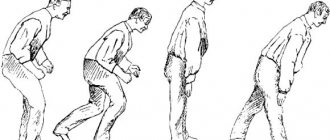As a person ages, his body becomes more susceptible to the influence of negative factors. Metabolic processes slow down, cells die en masse, and are not restored as quickly as before. The brain suffers the most, which causes the development of a number of neurological pathologies. Many of them at the initial stage proceed according to a similar scenario, and some are completely ignored - as a result, improper treatment or refusal of it leads to tragedy. A doctor should diagnose any pathology, but people should at least know the difference between Alzheimer's and Parkinson's diseases. This will help you notice warning signs of a dangerous condition in a timely manner and begin treatment early, improving the prognosis.
In old age, metabolic processes slow down, cells die en masse, and are not restored as quickly as before. The brain suffers the most, which causes the development of a number of neurological pathologies.
Etiology
To compare Parkinson's and Alzheimer's diseases, it is necessary to understand the mechanism of their occurrence and the principle of development. Both pathologies are neurological in nature – the victim’s brain is affected. Diseases in the vast majority of cases are registered in older people. They have a chronic course, characterized by slow progression with a gradual increase in the clinical picture.
Parkinson's and Alzheimer's occur against the background of degenerative processes in the tissues of the central nervous system. This leads to the death of cell colonies, atrophy of entire areas of the brain, and a decrease in the functionality of the organ. In Parkinson's, the death of neurons responsible for the synthesis of the neurotransmitter dopamine is recorded. A deficiency of the chemical compound contributes to irritation of the cerebral cortex by the basal ganglia, which leads to a number of characteristic symptoms.
Alzheimer's, according to the main theories, is the result of the accumulation of neurofibrillary tangles and amyloid plaques in the brain tissue. This triggers a sequence of degenerative changes in the tissues of the central nervous system. The resulting massive death of neurons and structural damage to cell colonies appear only several years after the start of the process.
What are the similarities between the diseases?
Parkinson's and Alzheimer's have many similarities, which makes diagnosis difficult. Even a neurologist is often unable to distinguish neurological diseases at the initial stage of development without special measures. Sometimes the early stage of the clinical form of pathologies is so blurred that the patient himself and his relatives do not even suspect the presence of a problem. They explain the alarming signs by old age, overwork, stress, non-compliance with the daily routine, and “age-related” chronic diseases.
Parkinson's disease and Alzheimer's syndrome share the following similar characteristics:
- Vivid symptoms mainly develop in old age. In the case of Parkinson's, this is 55-60 years old, Alzheimer's appears after 65 years;
- chronic conditions, slowly progressing;
- often both pathologies begin with the same symptoms: headaches, fatigue, decreased attention, poor coordination, dizziness;
- The prognosis in both cases is unfavorable due to the fact that neither condition can be completely cured. With Parkinson's disease, the chances of stable, long-term remission are still higher than with Alzheimer's;
- both diseases are believed to have a hereditary predisposition. The genetic factor does not become the cause of the pathology itself, but it greatly increases the likelihood of its occurrence.
Often both pathologies begin with the same symptoms, one of them is headaches.
The mechanisms of development of degenerative processes are different.
The causes of diseases are still being researched; there are several reliable theories. At the same time, doctors note similar risk factors, the influence of which on the body contributes to the triggering of reactions in the brain tissues, leading to changes in their structure.
Are diseases treatable?
Unfortunately, both pathologies are considered incurable and lead to disability and death of patients (usually from secondary infections in the later stages). However, medicine now offers many ways and techniques to stop degenerative processes and improve the quality of life of older people.
In Parkinson's disease, the basis of therapy is the prescription of symptomatic dopaminergic drugs (Levodopa). Treatment in the early stages of the disease helps to reduce symptoms and ensure active life. Medications are used to correct the neurochemical imbalance in the basal ganglia that causes decreased dopamine levels. Antidepressants are indicated for patients.
Non-drug treatment methods: therapeutic exercises, psychotherapy, physiotherapeutic procedures, maintaining existing abilities and skills and acquiring new ones.
Targeting the cause of Alzheimer's disease and slowing down cognitive decline by administering central cholinomimetics (Exelon) is what makes the treatment difference. Patients are also prescribed non-steroidal anti-inflammatory drugs, antioxidants, and nootropics. Treatment with psychotropic drugs and tricyclic antidepressants is carried out with caution.
How does Alzheimer's disease differ from Parkinson's disease?
The main differences between the two pathologies become obvious when assessing their clinical manifestations. Even in the early stages, an experienced neurologist only needs to talk with the patient and conduct a series of psychological and neuropsychological tests in order to suspect one of the diagnoses.
Features of the clinical picture of Parkinson's disease:
- tremor - initially an involuntary trembling affects only one of the hands. Over time, the symptom spreads to the second upper limb, head, legs. The fingers contract quickly and rhythmically, the head moves up and down or left and right;
- disturbance of motor activity - movements are constrained, significantly limited, their speed is slowed down;
- pathological increase in muscle tone - leads to poor posture and the appearance of a “petitioner” or “mannequin” pose in the patient. The person leans forward slightly, lowers his head, his arms bend slightly at the elbows;
- specific changes in blood pressure - occur when the patient changes body position;
- other signs are problems with night sleep, decreased sense of smell, impotence, enuresis, sweating, excessive salivation.
With Parkinson's disease, a person leans slightly forward, lowers his head, and his arms bend slightly at the elbows.
The patient's consciousness remains clear. He does not experience a decline in intelligence, and his memory and attention do not suffer. In the case of Parkinson's, one of the most effective methods of preventing Alzheimer's does not work - active mental activity. People with a high level of education, who have different interests and hobbies, have many interneuron connections formed in the brain. Against this background, in the event of damage to one zone of cell colonies, neighboring ones are able to take over its functions. This feature reduces the likelihood of developing Alzheimer's, but does not protect against Parkinson's.
Alzheimer's manifests itself in the form of the following symptoms:
- at the initial stage, changes in the patient’s condition are minimal and resemble the consequences of overwork. The patient is apathetic, does not perceive incoming information well and quickly forgets it;
- early dementia - memory problems progress, forcing the patient to use a diary. There is a deterioration in auditory and visual perception, the quality of information processing decreases, speech becomes more scarce and less intelligible. The clinical picture is complemented by motor disturbances against the background of problems with coordination - the patient becomes clumsy;
- moderate dementia – dementia becomes obvious. The victim uses fewer and fewer words in his speech; he no longer remembers the meaning of many definitions and names of objects. Long-term memory impairments occur, due to which the patient ceases to recognize loved ones. At this stage of Alzheimer's, the patient is unable to care for himself. Signs of personality changes appear in the form of unmotivated aggression, refusal to help, sudden irritability or crying;
- severe dementia - there is a loss of control over the body and its physiological functions. The patient does not speak, does not walk, is unable to feed independently, and sometimes even swallow.
Pathologies also have a number of similar symptoms. Parkinson's and Alzheimer's diseases are almost always accompanied by depressive disorders. At the initial stage, the symptom manifests itself in the form of a loss of interest of the patient in favorite activities, work, and others. Over time, this can turn into deep apathy, irritability, and anxiety.
Parkinson's and Alzheimer's diseases are almost always accompanied by depressive disorders.
Differences
Despite the clinical similarities of the pathologies, there are differences between them:
- In patients with Parkinson's disease, those parts of the brain that are responsible for motor function atrophy and die. Not only coordination is impaired, but also vision (blepharospasm, impaired accommodation), and the swallowing process. The following symptoms come to the fore: hypokinesia (slowness of movements, inability to maintain a “difficult posture”), increased muscle tone (stooping, half-bent limbs), tremor. In the later stages - walking disturbances, involuntary painful muscle contractions. In severe cases, complete loss of movement is possible.
- In Alzheimer's disease, signs such as lack of concentration, absent-mindedness, impaired memory and orientation come to the fore. Patients forget recent events. Already in the first stages, optical-spatial agnosia occurs (the patient forgets familiar places and does not remember the way home). Tremor and stiffness of movement are not the dominant symptoms.
- Patients with Parkinson's disease in the later stages experience urinary incontinence and dysfunction of the intestines and heart due to damage to the autonomic nervous system. In Alzheimer's, uncontrollable bowel movements and urination occur due to dementia.
- Dementia due to Parkinson's: changes in mental functions and thinking abilities are observed gradually. Despite the fact that emotionality decreases, patients can communicate productively with others for a long time.
- Dementia of the Alzheimer's type is manifested by severe cognitive disorders: anterograde and retrograde amnesia, speech disorders, breakdown of written speech (agraphia), reading (alexia), and habitual automated actions (apraxia). With severe memory defects, a person does not remember how to dress, cook food, use household utensils, serve himself, satisfy physiological needs (go to the toilet, eat, etc.).
- MRI in Alzheimer's patients visualizes a decrease in the gyri in the medial zone of the temporal lobe of the brain. In Parkinson's disease, sometimes no changes are detected.
When affected by the Alzheimer's type, a person first begins to confuse his relatives, forget his colleagues, while continuing to talk coherently with them. In people suffering from Parkinson's disease, in the initial stages of development of the pathology, it is not the memory itself that suffers, but the speed of its reproduction and emotional response.
Causes
The mechanisms of disease development are different, but the factors that aggravate degenerative processes in the brain are similar. It turns out that eliminating the influence of a number of irritants on the body simultaneously acts as a preventive measure for Alzheimer’s and Parkinson’s.
The following are the provocateurs of degenerative processes in the brain:
- traumatic brain injuries;
- harmful living and working conditions, poor ecology;
- severe migraines, chronic headaches;
- obesity;
- brain tumors;
- constant stress, experienced shock;
- bad habits;
- Irregular use of medications and inconsistent with the doctor.
In the case of Alzheimer's, several additional points apply. In particular, a low level of mental activity poses a danger to every person. Refusal to read, study foreign languages, or obtain higher education reduces the number of neural connections in the brain. Also
Brain tumors act as provocateurs of degenerative processes in the brain.










